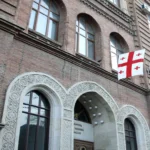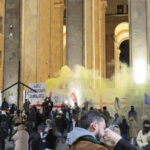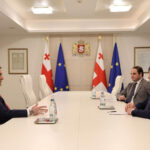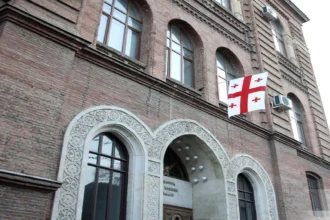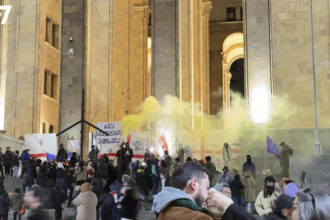US President Donald Trump (L), chatting with Russian President Vladimir Putin, as they attend the APEC Economic Leaders’ Meeting part of the Asia-Pacific Economic Cooperation leaders’ summit on November 11, 2017 in the central Vietnamese town of Danang. (Mikhail Klimentyev / SPUTNIK / AFP through Getty Images).
As the U.S. presidential election on Nov. 5 approaches, the debate intensifies over whether Donald Trump, one of the two possible winners, will act in Russian President Vladimir Putin’s interests.
The topic has been a hot one since Trump’s first term, but it accelerated this past week when the media in the United States cited new revelations from Bob Woodward‘s book “War,” a new book by renowned American journalist Bob Woodward. The book will be available next week.
According to Woodward, an unnamed source cited by Woodward, Trump has spoken seven times with Putin since leaving office in 2020.
The book also claims that Trump secretly sent Abbott Covid test machines to Putin during his second term as president, when the devices were scarce.
If true, this new information exposes another side to the controversial relationship between Trump, and Putin. Critics of the former president, who is seeking reelection in the fall, have accused him of selling both U.S. interests and Ukrainian interests to Russia.
The revelations are consistent with Trump’s past of praising Putin, and seeking a more friendly relationship with Russia. Analysts claim that Trump is a fan of Putin because he sees himself and the Russian leader together as “strongmen.”
Other facts about Trump’s past relations with Putin could indicate that a “sellout of U.S. interests and Ukrainian interests” is not inevitable. During Trump’s tenure as president from 2017 to 2020, the U.S. began to supply lethal weapons to Ukraine and killed Russian mercenaries.
Trump’s campaign for president has slammed Woodward’s book, saying that “none” of the stories in it are true. They also accused Woodward of bias.
Dmitry Peskov, Kremlin spokesperson, confirmed that the Covid tests were sent but denied that Trump and Putin spoke by phone multiple times since Trump left office.
Peskov added: “But the phone calls are not true.”
Trump, the’strongman’, selling out to Putin
“Surprise Surprise! Isn’t this special? Reno Domenico of Democrats Abroad Ukraine told the Kyiv Independent that our former president was BFFs with dictator and war monger Vladimir Putin.
“This is somewhere between fraternizing and the enemy, and being a Kremlin spy.” Do you believe the subject of Ukraine’s surrender was discussed during the phone conversations?
Adrian Karatnycky is a senior fellow at the Eurasia Center of the Atlantic Council and a non-resident. He said that Woodward’s revelations “are a remarkable indication of longstanding and ongoing connections between Putin and Trump.”
“The secrecy surrounding this is as important, as the possible content of their conversations,” he told The Kyiv Independent. “It was reported that some of these conversations took place well after the genocidal assaults on Ukraine and after it became clear that Putin had been indicted as war criminal. They took place as late as 2024.”
Karatnycky said that “we all knew and suspected that there was a’special’ relationship between Trump and Putin, but these ongoing conversations and some things Trump says about a quick (solution) to Russia’s war on Ukraine leads one to conclude that they may’ve had preliminary discussions about a sellout of Ukraine.
Even in Kyiv there is speculation about the reliability of the new information presented Woodward.
Woodward’s report is based on a single source and no other sources confirmed it. The New York Times interviewed twenty current and former Trump administration officials, career intelligence officials and Biden administration officials. They all said that they were unaware of any contacts between Trump or Putin in the time since Trump left office.
Woodward interviewed Trump 20 times between 2016 and 2020 for his previous works, but the Trump campaign claimed that he wasn’t given access to “War.”
Volodymyr Fensenko, a Ukrainian political analyst, told the Kyiv Independent that the source is the most important question. “Where did he get this information?” It’s a rumor.”
Fesenko, who is a regular commentator on Ukrainian state TV, which is controlled by the administration of President Volodymyr Zelensky during martial law, said that Woodward wasn’t a neutral source because he had always supported the Democrats.
He said, however, that it is undeniable that Trump has a soft-spot for Putin and “this has long been known.”
He said that Trump sympathizes strongly with strong leaders. “He is prone to flattery and Putin takes advantage.”
Dmitry Oreshkin, a Russian political analyst, said that “Putin is the same as Trump in terms of politics.”
“They are strongmen, authoritarian leaders,” he told The Kyiv Independent.
“Trump is a Putin, and they are both of the same kind. They understand each other instinctively.” “For Putin, it is more convenient to negotiate (than with Biden and Harris)”, he added. He was referring to the Democratic Party candidates, including outgoing U.S. president Joe Biden and his vice president Kamala Harris, who will be competing with Trump in the upcoming presidential election.
Trump’s history with Russia and friendly relations
Trump has repeatedly praised and backed Putin, but rarely criticised him.
In 2018, Trump accepted Putin’s denial that Russian interference in the 2016 U.S. Presidential election.
Trump described Putin’s invasion as “genius” in 2022.
There are also well-documented ties between Trump’s team, and the Kremlin.
In 2015, Trump’s former National security advisor Michael Flynn received $45,000 for a speech in Moscow at a Kremlin controlled TV network’s anniversary celebration, where he sat at Putin’s banquet table.
Flynn met with Sergey Kislyak, the Russian ambassador, on numerous occasions. Flynn and Special Counsel Robert Mueller reached an agreement in 2017 for Flynn to plead guilty on a felony charge of making false statements to Federal Bureau of Investigations regarding his contacts with Sergey Kislyak.
The Republican-controlled Senate Intelligence Committee concluded in 2020 that Trump’s former campaign manager Paul Manafort “represented a grave counterintelligence threat” by creating opportunities for “Russian intelligence services to exert influence over, and acquire confidential information on the Trump campaign.”
During Trump’s tenure, the directors of Russia’s three main intelligence agencies (FSB SVR and GRU) paid a rare visit to Washington D.C., where they met with top U.S. officials. Two of them were listed on the U.S. sanction list.
In 2019, the Mueller special counsel investigation concluded that Russia interfered with the 2016 presidential elections to favor Trump. The investigation did not find any evidence that Trump, or any of Trump’s aides, coordinated with the Russian government in its 2016 election interference.
Trump has been accused of pushing Ukraine to sign a peace agreement with Russia under Putin’s terms in the run-up this autumn’s presidential elections.
He said that if he were elected again in 2023, he would ask Ukrainian president Volodymyr Zelensky and Putin to reach a peace agreement, ending Russia’s full scale invasion.
Trump said he would also warn Putin that if an agreement was not reached, the U.S. military would increase its support for Ukraine. Reuters reported that two Trump advisors had proposed a plan to stop military aid to Ukraine unless the country agreed to hold peace talks with Russia rather than continue to push back against Russia in an existential conflict.
The Javelins Saga and Trump’s Russia Policy
Despite the Trump administration’s alleged ties with the Kremlin some observers, such as Fesenko, claim that U.S. – Russian relations deteriorated from Trump’s presidency in 2017 to 2021.
Fesenko stated that “Trump wanted to make a deal with Putin”, and improve relations between both countries, but “Putin did not make any concessions to Trump.”
He also pointed out that the Trump administration’s 2017 decision to begin supplying lethal weapons to Ukraine, namely Javelin Anti-tank Missiles, was a sign of worsening relationships with the Kremlin.
According to a Congressional investigation, Trump, despite the Javelins being supplied, withheld military assistance and an invitation from Zelensky to the White House in 2019 to influence Ukraine and have them announce an inquiry into Trump’s political rival Joe Biden, and to promote the conspiracy that Ukraine was behind the interference in the 2016 Presidential election. The House of Representatives impeached Trump for these actions, but the Senate acquitted him.
Trump’s supporters also blocked $61 billion in U.S. military assistance from October 2023 to April 2024.
Domenico dismissed Domenico’s argument that Trump’s relations with Putin had deteriorated.
He said that the only thing he could point to was “the story about Javelins.” “And the Javelins came only because Trump was caught up in the impeachment controversy at the time and had to act as if he was doing anything.”
He said that “when (Russian Foreign Ministry Sergei) Lavrov and the ambassador were in the White House, laughing and joking in January 2017, everything looked hunky dory to me between Russia’s and Donald Trump.
In 2018, the U.S. and its allies also killed dozens of Syrian soldiers, as well as an unknown number of Russian Wagner Group mercenaries during the Battle of Hasham.
In 2018, Trump went so far as criticizing Putin directly, saying that he was responsible his ally, Syrian dictator Bashar Al-Assad, chemical attacks.
He said that “President Putin and Russia are responsible for supporting Animal Assad.”
Under Trump’s administration, the U.S. also imposed sanctions on Russian companies and the Nord Stream 2 pipeline that runs from Russia to Germany.
In 2018, the U.S. expelled 60 Russian diplomats in response to the poisoning of Sergei Skripal and Yulia in the U.K. The U.K. government has accused the Kremlin for organizing the assassination.
Oleg Sukhov works as a reporter for the Kyiv Independent. He was a former Moscow Times editor and reporter. He holds a master’s in history from Moscow State University. He moved to Ukraine due to the crackdown in Russia on independent media and covered wars, corruption, reforms, and law enforcement.
Read More @ kyivindependent.com
